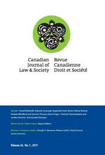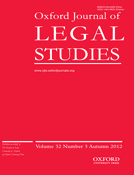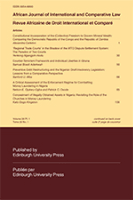
African Journal of Legal Studies
Scope & Guideline
Bridging Gaps in African Legal Discourse
Introduction
Aims and Scopes
- Human Rights and Social Justice:
The journal consistently explores themes surrounding human rights, social justice, and the legal frameworks that govern these issues, emphasizing the need for equitable access to justice in diverse African contexts. - Comparative Legal Analysis:
A significant focus is placed on comparative studies that analyze legal systems across different African countries, providing insights into the effectiveness and challenges of various legal practices. - Gender and Legal Reforms:
The journal dedicates attention to gender-related legal reforms, assessing their impact on women's rights and participation in governance, highlighting the need for gender-sensitive policies. - Impact of Technology and Cybercrime:
The exploration of cybercrime and the intersection of technology with legal practices is becoming increasingly relevant, reflecting the need to adapt legal frameworks to contemporary challenges. - Environmental Law and Sustainability:
Issues surrounding environmental protection, biodiversity, and the legal implications of land investments are core areas where the journal provides critical analysis and recommendations. - Conflict Resolution and Legal Dilemmas:
The journal addresses legal dilemmas arising from conflicts, both communal and international, focusing on the role of law in resolving disputes and promoting peace within affected regions.
Trending and Emerging
- Cybersecurity and Digital Rights:
With the rise of technology, topics related to cybersecurity, digital rights, and the legal frameworks governing them are gaining traction, highlighting the need for updated laws in the digital age. - Gender Equality and Empowerment:
An increasing number of articles focus on gender equality, particularly in political representation and legal reforms, indicating a growing recognition of the importance of women's rights in governance. - Environmental Law and Climate Justice:
The journal is witnessing a surge in discussions surrounding environmental law, particularly in relation to climate change and its legal implications, underscoring the urgency of sustainable legal frameworks. - Indigenous Rights and Land Law:
There is a notable increase in publications addressing the rights of indigenous peoples and land law, reflecting broader discussions on land ownership, usage rights, and legal protections. - Access to Justice and Legal Reform:
Recent themes emphasize the barriers to accessing justice and the necessity for legal reforms that promote inclusivity and fairness in legal proceedings across Africa.
Declining or Waning
- Traditional Cultural Practices and Law:
There has been a noticeable decline in the exploration of traditional cultural practices within the legal context, possibly indicating a shift towards more contemporary legal challenges and frameworks. - General Legal Education and Theory:
Discussions on broad legal education theories and methodologies appear to be diminishing, as the journal increasingly emphasizes specific legal issues and case studies relevant to current African contexts. - International Relations and Law:
The focus on international relations as a standalone theme is waning, with more articles integrating these discussions into broader national legal issues rather than treating them as separate subjects. - Criminal Law Theories:
The analysis of criminal law theories, especially those not directly tied to contemporary issues such as cybercrime or human rights abuses, seems to be less frequent in recent publications.
Similar Journals

Canadian Journal of Law and Society
Navigating the Complexities of Law Through a Social LensThe Canadian Journal of Law and Society, published by Cambridge University Press, is a distinguished academic journal dedicated to the multidisciplinary exploration of legal systems, social dynamics, and the intricate relationships that shape law and society. With an ISSN of 0829-3201 and an E-ISSN of 1911-0227, this journal has made significant contributions to the fields of Law, Sociology, and Political Science since its inception in 1986. Recognized in the 2023 category quartiles as Q3 in both Law and Sociology and Political Science, it stands as a credible platform for critical research, theoretical discussions, and empirical studies. Although not an open-access journal, it provides valuable insights that foster academic discourse and enhance understanding within the legal and social sciences domains. Addressed from the Edinburgh Building, Shaftesbury Road, Cambridge, England, the journal serves as an essential resource for researchers, practitioners, and students seeking to navigate the complexities of law and its societal impacts.

University of Western Australia Law Review
Advancing Legal Discourse, Shaping TomorrowThe University of Western Australia Law Review is a prestigious academic journal dedicated to the critical examination and exploration of legal issues in Australia and beyond. Published by the Law School of the University of Western Australia, this journal has become a significant resource for legal scholars, practitioners, and students alike, contributing to the rich discourse in the field of law. With an ISSN of 0042-0328 and a current categorization in the Q3 quartile in the field of Law as per the 2023 rankings, it stands among a cohort of respected legal publications. The journal, though not open access, facilitates a sharing of unique insights and research from 2019 to 2024, aiming to address emerging and traditional legal challenges within a global context. With a Scopus rank of #651 out of 1025 in Social Sciences Law, it holds a percentile of 36, reflecting its valuable contributions to legal scholarship. The University of Western Australia Law Review invites researchers, practitioners, and students to engage with its rich content and to contribute to the ongoing dialogue shaping the future of law.

Annual Review of Law and Social Science
Empowering Research at the Confluence of Law and SocietyThe Annual Review of Law and Social Science, published by ANNUAL REVIEWS, is an essential interdisciplinary journal that bridges the domains of law, sociology, and political science. Established in 2006, this pivotal resource has consistently been recognized for its scholarly excellence, achieving a Q1 ranking in both the Law and Sociology and Political Science categories as of 2023. With a remarkable Scopus ranking that places it in the 93rd percentile among law journals, it serves as a vital platform for researchers and professionals seeking to engage with comprehensive reviews of contemporary issues at the intersection of these fields. Although not an open-access journal, its contributions are fundamental for advancing scholarship and fostering deeper insights into the relationship between social dynamics and legal frameworks. The journal's rigorous annual reviews provide valuable syntheses of the latest research, making it an indispensable resource for academics, policymakers, and students alike.

UNIVERSITY OF NEW SOUTH WALES LAW JOURNAL
Advancing Legal Scholarship Through Interdisciplinary InsightsUniversity of New South Wales Law Journal, published by the University of New South Wales, Faculty of Law, is a leading academic journal that serves as an essential platform for discourse in the field of legal studies. With an ISSN of 0313-0096 and an E-ISSN of 1839-2881, the journal has been a beacon of legal scholarship since its inception in 1983. Operating from Kensington, New South Wales, Australia, it provides profound insights into various legal issues, emphasizing interdisciplinary perspectives by also being recognized in the fields of philosophy, sociology, and political science. While it maintains a Q3 ranking in Law and has shown increased visibility in Philosophy at Q2 according to the 2023 category quartiles, the journal assures a diverse range of critical analyses from scholars, professionals, and students alike. It is particularly valuable for researchers seeking to engage with contemporary legal debates, ensuring they remain at the forefront of academic and practical discussions in law and related disciplines.

Oxford Journal of Legal Studies
Navigating the Landscape of Modern Legal ChallengesThe Oxford Journal of Legal Studies, published by Oxford University Press, stands as a prestigious platform for scholarly discourse within the field of law. Renowned for its impactful contributions to legal scholarship since its inception in 1981, this journal has established itself in the top tier of its category, currently classified as Q1 in Law based on the 2023 category quartiles. With its ISSN 0143-6503 and E-ISSN 1464-3820, the journal provides a comprehensive exploration of contemporary legal issues, theoretical perspectives, and empirical research, attracting contributions from leading academics and practitioners alike. Residing within the Social Sciences arena, it holds an impressive rank of 194/1025, landing it in the 81st percentile according to Scopus rankings. Though not currently an open-access publication, the Oxford Journal of Legal Studies remains vital for researchers, professionals, and students eager to deepen their understanding of legal frameworks and contemporary challenges within the legal landscape. Located in the heart of the United Kingdom, at Great Clarendon St, Oxford OX2 6DP, England, the journal is an indispensable resource for those advancing the study and practice of law.

Legal Theory
Deepening Understanding of Contemporary Legal FrameworksLegal Theory, published by Cambridge University Press, stands as a significant academic journal dedicated to the exploration of the conceptual foundations and implications of law within the wider realm of philosophy. Established in 1995 and maintaining a consistent publication record through 2023, the journal has garnered a reputation for its high-quality scholarly contributions, reflected in its impressive rankings: Q2 in Law and Q1 in Philosophy as of 2023. With an impactful presence in the Scopus Ranks, Legal Theory is positioned 158th in Philosophy and 337th in Law, highlighting its relevance and influence—especially within the arts and humanities. This journal serves as a critical platform for researchers, professionals, and students who seek to engage with the intricate interplay between legal norms and philosophical inquiries. Though not open access, it offers a wealth of knowledge that is integral to advancing discourse in legal philosophy, making it an essential resource for those looking to deepen their understanding of contemporary legal theories and their implications.

African Journal of International and Comparative Law
Illuminating Africa's Legal LandscapeAfrican Journal of International and Comparative Law is a distinguished publication that serves as a vital forum for scholarly discourse in the fields of international and comparative law, with a specific focus on legal issues pertinent to the African continent. Published by Edinburgh University Press, this journal boasts a respectable impact factor and finds its reputation bolstered by its strategic ranking within the Q3 category of law, according to Scopus metrics, where it occupies the 681st rank out of 1025 journals. Although it does not currently offer open access, the journal remains committed to fostering legal scholarship and providing critical insights that bridge the gap between theory and practice. The journal's coverage encompasses scholarly articles, case studies, and analyses of contemporary legal challenges from 2005 to 2024, making it an indispensable resource for researchers, practitioners, and students dedicated to advancing their understanding of international and comparative legal frameworks in the African context. The editorial team encourages submissions that contribute to the dialogue on legal reforms, human rights, and the impact of globalization on African law.

Washington International Law Journal
Fostering Insightful Discourse on Global Legal IssuesWashington International Law Journal is a distinguished publication dedicated to the field of international law, published by the University of Washington. With an ISSN of 2377-0872, this journal provides a vital platform for scholarly discourse and critical analysis on global legal issues, ranging from human rights to trade law. Although it currently does not offer open access options, the journal aims to facilitate the dissemination of pioneering research and insightful commentary from leading scholars and practitioners in the field. It holds significant value for researchers, professionals, and students seeking to deepen their understanding of international legal frameworks and their implications worldwide. The journal’s commitment to fostering academic excellence positions it as an essential resource for anyone engaged in the dynamic landscape of law on an international scale.

Access to Justice in Eastern Europe
Advancing Understanding, Enhancing Access.Access to Justice in Eastern Europe is a pivotal journal published by the EAST EUROPEAN LAW RESEARCH CENTER that aims to enhance the understanding and discourse on legal access and justice systems within Eastern Europe. Since its inception in 2018, this open-access journal has made its valuable contributions freely available, fostering an inclusive academic environment for researchers, professionals, and students alike. With an impressive Q2 ranking in the field of Law and a notable Scopus Rank of #477 out of 1025 in the Social Sciences, this journal plays a crucial role in influencing policy and practice through evidence-based research. Addressing the nuances of legal access, the journal covers diverse topics including legal frameworks, social justice, and the impact of law on marginalized communities, with contributions from both local and international scholars. With an ongoing annual volume that extends to 2024, it serves as a vital resource for those committed to the advancement of justice in the region.

Revista General de Derecho Penal
Advancing the discourse in criminal law.Revista General de Derecho Penal, published by IUSTEL, is a premier academic journal dedicated to the dynamic field of criminal law. With an ISSN of 1698-1189, this journal serves as a crucial platform for researchers, legal professionals, and students to share their insights and findings related to penal law and its evolving applications in contemporary society. Although it is not an open access journal, it maintains high scholarly standards, helping to advance discourse in legal studies. The journal's address is C PRINCESA NO 29, 2A DCHA, MADRID 28008, SPAIN, positioning it within a vibrant academic community. With a focus on current legal challenges and theoretical advancements, Revista General de Derecho Penal plays an essential role in fostering understanding and developing effective legal frameworks in criminal justice, making it an invaluable resource for those engaged in the study and practice of law.